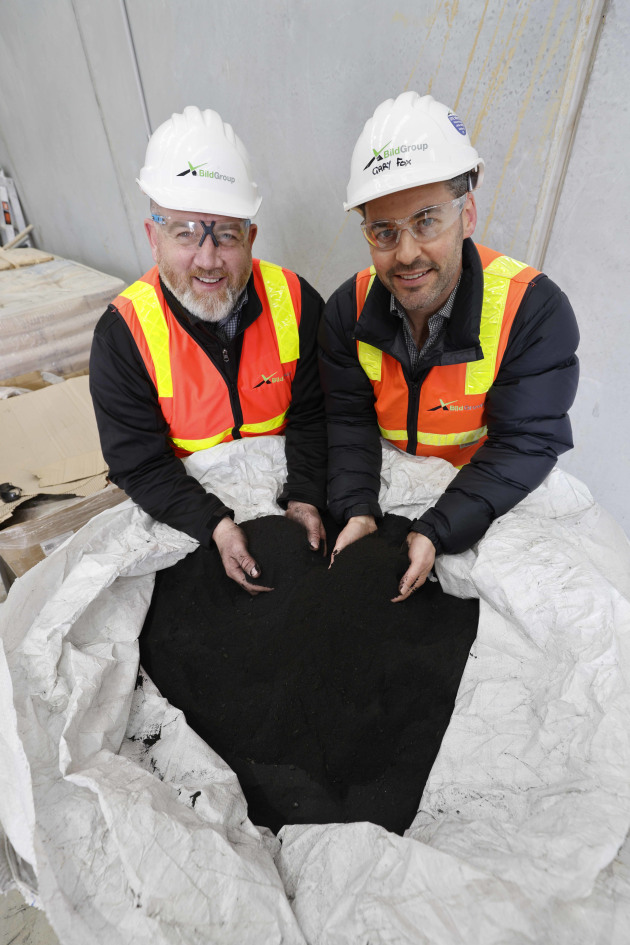Research from RMIT University is making it possible for waste coffee grounds to be turned into building materials, by creating a biochar that strengthens concrete by 30 per cent. The technique will be used in a major infrastructure project for the first time in a footpath in Pakenham, Melbourne.
Organic waste going to landfill, including spent coffee grounds, contributes 3 per cent of greenhouse gas emissions. Finding innovative ways to reuse and upcycle food waste has been a critical point of research in the sector, and scientists from RMIT have recently cemented a method to bring coffee waste back into service.
The RMIT team developed a technique to make concrete 30 per cent stronger by turning waste coffee grounds into biochar, using a low-energy process without oxygen at 350 degrees Celsius. The waste cannot be added directly to concrete because it would decompose over time and weaken the building material, which is why the used coffee is converted into biochar before being added to the concrete mix.

Indigenous-owned coffee supplier, Talwali Coffee Roasters, provided used ground coffee for the research. Earlier this year, RMIT teamed up with Macedon Ranges Shire Council to conduct a successful world-first trial of coffee concrete in a footpath in Gisborne, Victoria.
Major Road Projects Victoria (MRPV) and project contractor BildGroup have used the coffee biochar in place of river sand in the Pakenham Roads Upgrade, part of Victoria’s Big Build. For the project, Earth Systems converted 5 tonnes of spent coffee grounds – about 140,000 coffees worth of grounds – into 2 tonnes of biochar, which has been laid into the 30 metres cubed footpath along McGregor Road in Pakenham.
MRPV program director, Brendan Pauwels, said coffee concrete had the potential to cut costs and remove vast amounts of waste material from landfill.
“These numbers are remarkable in terms of ecological benefit, and we’re excited to see the Pakenham Roads Upgrade be the first Victorian Big Build project to use the coffee concrete,” he said.
Australia generates 75 million kilograms of ground coffee waste every year – most of it goes to landfills, but it could replace up to 655 million kilograms of sand in concrete because it is a denser material. Globally, 10 billion kilograms of spent coffee is generated annually, which could replace up to 90 billion kilograms of sand in concrete.
BildGroup CEO and RMIT alumnus, Stephen Hill, said he was happy for the company to lead the way and be the first to bring coffee concrete to a major infrastructure project for the Australian construction industry.
“With the coffee concrete we’ve poured, we’re diverting an estimated 140,000 coffees from landfill and saving over 3 tonnes of sand, which have enormous environmental benefits,” said Hill.
The future of upcycled food
Upcycling food waste has become a constantly expanding area of research and innovation over the past five years, now seen as essential to achieving United Nations Sustainable Development Goal 12.3, which aims to halve global food waste by 2030.
Brisbane based start-up, I Am Grounded, recovers wasted coffee fruit after it is harvested for the beans, which only make up 10-20 per cent of the fruit. They use this natural byproduct, which would otherwise go to waste, to create functional snack bars – cutting down on the 20 billion kilograms of coffee fruit waste per year, 50 grams at a time.
CSIRO is working with food company, Nutri V, to save imperfect vegetables from landfill, by converting them into shelf-stable powders made from repurposed imperfect broccoli, cauliflower, and pumpkin. They are also collaborating with sustainability start-up, Food Recycle, to turn commercial food waste into animal feed.
There is even more happening outside of Australia, in both the ingredients and packaging sectors.
Earlier this year, Malta based manufacturer, BioPowder, introduced a sustainable packaging solution using olive stone powders, derived from the by-products of olive oil production. These powders, branded as Olea FP (Functional Powder), are designed to improve the performance of biodegradable packaging, aiding the transition to eco-friendly materials. Dutch ingredient manufacturer, Fooditive Group, developed a sweetener from waste side-streams of apple and pear processing, Keto-Fructose, through fermentation.
It’s clear that environmentally minded individuals and organisations are taking a stand to keep organic waste out of landfill, and making the most of fruit and vegetables to tackle complex problems.






